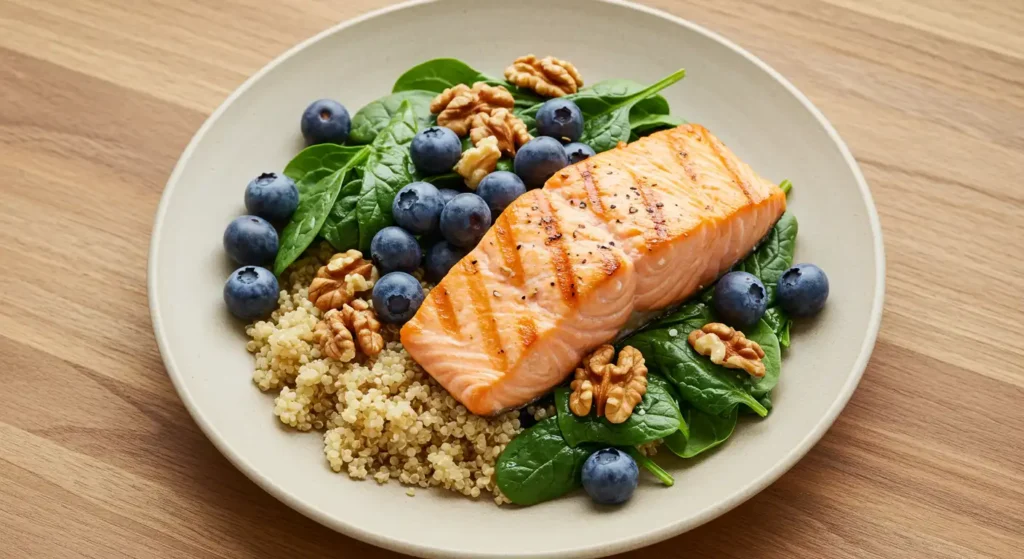Introduction
Healthy aging isn’t something we should only think about when we’re older it starts now. Building strong brain health habits today can dramatically improve your quality of life as you age. By prioritizing your mental wellness with a proactive lifestyle, you can prevent cognitive decline naturally and protect your brain’s performance for years to come.
In fact, experts agree that incorporating daily brain exercises, choosing the right foods for memory and focus, and making intentional decisions in your lifestyle significantly impact how well your brain ages. From sharpening focus to enhancing memory retention, these habits lay the foundation for long-term mental agility.
Daily Brain Exercises and Brain Health Habits to Boost Cognitive Performance and Prevent Cognitive Decline Naturally

As we age, maintaining mental clarity and memory becomes increasingly important. However, cognitive decline isn’t inevitable. In fact, studies show that incorporating consistent daily brain exercises into your lifestyle can significantly improve mental agility and even prevent cognitive decline naturally. These exercises aren’t just beneficial they’re essential to promoting long-term brain health.
One of the key mechanisms behind this is neuroplasticity, the brain’s remarkable ability to adapt by forming new neural connections. The more we challenge our brain with intentional mental tasks, the more flexible and resilient it becomes. As a result, activities that stimulate thought, memory, and reasoning can help preserve mental function well into old age.
According to the National Institute on Aging, brain-training activities may help improve memory and processing speed in older adults (source).
Puzzles and Strategy Games: Brain Health Habits That Strengthen Cognitive Muscles in Fun Ways
Puzzles are far more than just leisurely pastimes they’re powerful tools to keep your brain in top shape. Games like crosswords, Sudoku, chess, and memory challenges tap into your brain’s working memory, logic, and spatial reasoning. Not only do they stimulate mental activity, but they also encourage critical thinking and pattern recognition.
Engaging in these mentally stimulating games regularly fosters persistence and attention to detail. They also activate the prefrontal cortex the area responsible for complex thought. Over time, this can enhance your ability to focus, recall information, and make quicker decisions.
Incorporating these challenges into your daily brain exercises routine even just for 15 minutes a day can make a significant impact on brain longevity.
Learn Something New Every Day: Brain Health Habits to Fuel Mental Growth and Prevent Cognitive Decline Naturally
Another effective way to prevent cognitive decline naturally is to embrace the habit of lifelong learning. Whether you’re mastering a new language, diving into an online course, or exploring a new musical instrument, learning new skills consistently activates multiple areas of the brain especially the hippocampus, the region associated with memory formation and retention.
Moreover, staying curious and engaged encourages dopamine production, a neurotransmitter linked to motivation and learning. It also enhances neurogenesis the growth of new brain cells making your mind more adaptable and creative.
Tip: Dedicate at least 20–30 minutes each day to exploring something unfamiliar. This small daily commitment can lead to big cognitive rewards.
Journaling and Reflective Writing: A Daily Lifestyle Habit for Mental Clarity
Writing isn’t just a form of expression it’s a powerful mental exercise. Daily journaling improves memory recall, enhances focus, and strengthens language and reasoning centers in the brain. This makes it one of the most accessible and effective brain health habits you can adopt.
More than that, reflective writing supports emotional regulation, which is directly tied to cognitive performance. Stress impairs memory and concentration, but journaling offers a way to process emotions and reduce mental clutter.
Try this: Start or end your day by writing for 10 minutes about your thoughts, goals, or something you’ve learned. Over time, this habit will not only sharpen your thinking but also improve your self-awareness.
Daily Brain Exercises and Brain Health Habits for a Sharper Mind: How to Prevent Cognitive Decline Naturally

Transforming these daily brain exercises into regular parts of your lifestyle doesn’t have to be overwhelming. In fact, small changes can lead to profound benefits. Begin by identifying the time of day when you feel most mentally alert and commit to 15–30 minutes of focused brain activity.
You can rotate between puzzles, new learning experiences, and journaling to keep things engaging. Over time, this variety will prevent mental fatigue while nurturing different cognitive functions.
To reinforce the habit, link your brain exercises to another routine like morning coffee or your evening wind-down. This consistency will help make it second nature.
Lifestyle Strategies to Prevent Cognitive Decline Naturally and Strengthen Brain Health Habits

Your daily lifestyle choices form the foundation of your brain’s future. While genetics play a role, science increasingly shows that brain health habits especially those related to sleep, stress management, and social engagement can prevent cognitive decline naturally and even reverse some age-related damage.
Indeed, how you live today influences your mental clarity tomorrow. By adjusting your habits now, you’re not only protecting your cognitive function, but also improving your emotional resilience and overall well-being. This is why adopting a proactive lifestyle is one of the smartest investments in healthy aging.
Your lifestyle choices play a monumental role in brain aging. Everything from how you sleep to how you handle stress directly impacts your brain’s functionality. To prevent cognitive decline naturally, adopt routines that support both mind and body.
Prioritize Restorative Sleep: Essential Brain Health Habits to Recharge Your Mind Every Night
Getting consistent, high-quality sleep is one of the most underrated yet essential brain health habits. During sleep, especially deep and REM stages, your brain works to consolidate memories, regulate emotions, and clear out toxins through the glymphatic system.
Lack of sleep, on the other hand, leads to increased beta-amyloid buildup the same protein linked to Alzheimer’s disease. In addition, poor sleep can negatively affect concentration, decision-making, and emotional balance.
To maximize restorative sleep:
- Maintain a regular bedtime and wake-up schedule even on weekends.
- Avoid screens at least one hour before bed.
- Create a calm, dark, and cool sleep environment.
- Limit caffeine after noon and avoid heavy meals before sleeping.
Aim for 7 to 9 hours of uninterrupted sleep per night to support optimal cognitive functioning and emotional regulation.
Manage Stress Mindfully: Brain Health Habits That Protect Against Chronic Cortisol Damage
Stress is inevitable, but how you respond to it matters. Chronic stress floods the brain with cortisol, a hormone that, in excess, has been shown to shrink the hippocampus the region responsible for memory and learning. Over time, this accelerates mental fatigue, impairs focus, and increases the risk of depression and cognitive decline.
Fortunately, mindfulness-based practices have emerged as powerful tools for mental protection. Activities such as meditation, breathwork, yoga, and even nature walks help regulate your stress response, lower cortisol, and improve your attention span and working memory.
You don’t need hours just 10 to 15 minutes of daily mindfulness can offer substantial cognitive benefits. Try starting your morning with a guided meditation or ending your day with a few minutes of intentional deep breathing.
Build Strong Social Connections: The Lifestyle-Based Brain Health Habit That Keeps Your Mind Sharp
While often overlooked, social interaction plays a vital role in maintaining brain health. Humans are inherently social beings, and meaningful engagement stimulates neural circuits related to empathy, memory, and emotional regulation. In contrast, social isolation is a major risk factor for dementia.
In fact, a large-scale study published in The Lancet linked regular social activity to a 26% lower risk of developing dementia (source).
Here’s how to strengthen your social brain:
- Join a hobby group, book club, or community class.
- Volunteer in your neighborhood or church.
- Schedule regular calls or visits with friends and family.
- Engage in deep, meaningful conversations instead of superficial exchanges.
By staying socially connected, you don’t just support emotional health you activate brain areas linked to language, decision-making, and memory.
Foods for Memory and Focus: Nutrition-Based Brain Health Habits That Prevent Cognitive Decline Naturally

When it comes to building long-term brain health habits, one of the most influential and immediate changes you can make is through your lifestyle specifically, your diet. Scientific research increasingly confirms that the foods we eat not only affect physical well-being but also play a direct role in mental clarity, memory, and emotional stability.
In fact, adopting a diet rich in foods for memory and focus is one of the most effective ways to prevent cognitive decline naturally. Your brain, like any other organ, needs consistent fuel and high-quality nutrition is essential to preserve neuroplasticity, protect against inflammation, and maintain energy throughout the day.
Omega-3 Fatty Acids: Essential Fats for Cognitive Longevity
Omega-3s are among the most powerful nutrients when it comes to brain preservation. These essential fatty acids form the structural building blocks of brain cell membranes and improve communication between neurons. As a result, they enhance learning, reduce symptoms of depression, and protect against neurodegeneration.
To integrate them into your daily brain health habits, regularly consume:
- Fatty fish like salmon, sardines, or mackerel (2–3 times per week).
- Chia seeds and flaxseeds (great in smoothies or oatmeal).
- Walnuts (a perfect brain-shaped snack full of omega-3 ALA).
Research has consistently shown that diets high in omega-3s are linked to slower brain aging and a reduced risk of Alzheimer’s disease.
Antioxidant-Rich Foods: Protecting Your Brain from Oxidative Stress
Oxidative stress is a primary contributor to aging and cognitive decline. Fortunately, antioxidants can help neutralize the free radicals that damage brain cells over time. Incorporating antioxidant-rich foods into your diet is a powerful way to prevent cognitive decline naturally.
Top sources include:
- Blueberries: Nicknamed “brain berries” for their memory-boosting effects.
- Dark chocolate: Contains flavonoids, caffeine, and antioxidants that enhance focus and mood.
- Leafy greens: Spinach, kale, and Swiss chard are rich in vitamins A, C, and K, supporting brain cell regeneration.
Studies suggest that consuming blueberries consistently can delay brain aging by up to 2.5 years, thanks to their high anthocyanin content (source).
Whole Grains and Complex Carbohydrates: Sustained Energy for Mental Focus
Unlike sugary snacks that cause spikes and crashes in blood sugar, complex carbohydrates provide steady, long-term energy essential for maintaining attention, working memory, and problem-solving skills throughout the day.
Incorporate these foods for memory and focus into your meals:
- Quinoa: High in protein and fiber, it also contains magnesium a mineral vital for nerve function.
- Oats: A slow-digesting grain that supports blood sugar regulation and keeps your brain fueled longer.
- Brown rice: Rich in B vitamins that help convert food into brain energy.
These brain health habits aren’t about short-term diets they’re long-term strategies for mental longevity. When you fuel your brain with the right foods, you support your focus, mood, and memory well into old age.
Follow the MIND Diet: A Proven Lifestyle to Prevent Cognitive Decline Naturally
The MIND diet (Mediterranean-DASH Intervention for Neurodegenerative Delay) is a research-backed nutritional approach specifically designed to reduce cognitive decline. It combines elements of the Mediterranean and DASH diets, emphasizing brain-healthy foods and minimizing those that contribute to inflammation and oxidative damage.
Key features include:
- Daily servings of leafy greens and vegetables.
- At least two servings of berries per week.
- Weekly intake of nuts, beans, and fish.
- Olive oil as the primary cooking fat.
One landmark study found that those who adhered strictly to the MIND diet reduced their risk of Alzheimer’s disease by up to 53%. Even moderate adherence led to a 35% reduction (source).
Long-Term Brain Health Habits to Implement Today

Establishing brain health habits early is the key to sustainable cognitive strength. These long-term strategies foster resilience and protect your brain well into old age.
Stay Physically Active
Regular movement boosts blood flow to the brain and promotes growth factors that help neurons thrive. Walking, dancing, and strength training are particularly effective.
Avoid Toxins and Limit Alcohol
Alcohol and environmental toxins accelerate brain aging. Use clean products, avoid processed food, and consume alcohol in moderation.
Commit to Lifelong Learning
Stay curious and continually expose yourself to new information and ideas. The more active your brain, the stronger its ability to adapt.
Conclusion: Start Your Brain Health Habits Today
Healthy aging starts with intentional choices. The sooner you begin developing brain health habits, the more effectively you can prevent cognitive decline naturally and enhance your overall quality of life. Through consistent daily brain exercises, nourishing foods, and a smart lifestyle, your brain can remain sharp, focused, and resilient for years to come.
It’s never too late or too early to take control of your cognitive future.






